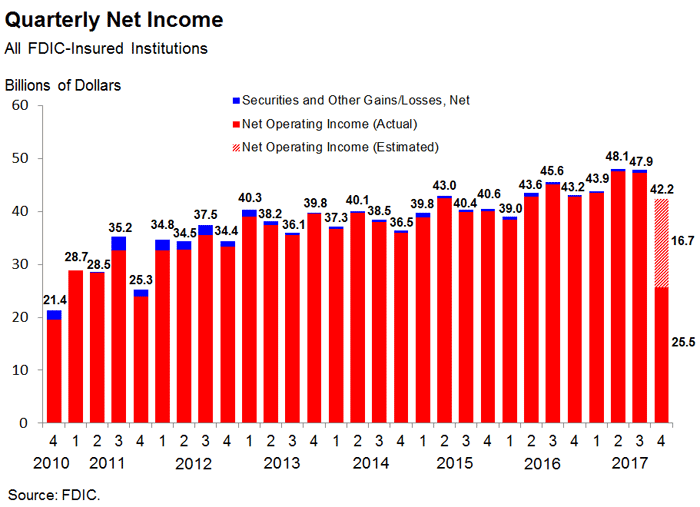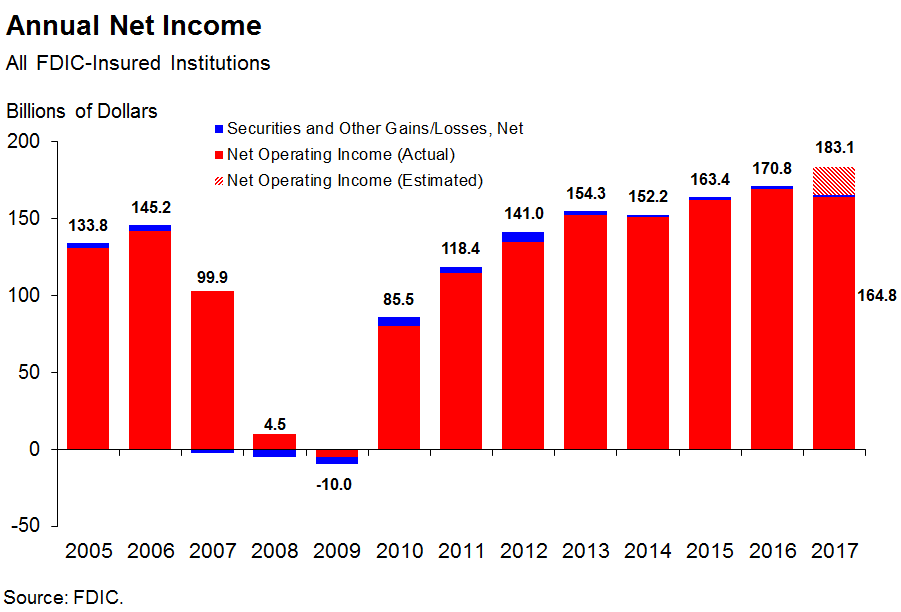- Quarterly Net Income Is 40.9 Percent Lower than a Year Ago Largely Due To One-Time Changes from the New Tax Law
- Excluding Changes from the New Tax Law, Estimated Quarterly Net Income Would Have Been $42.2 Billion, Down 2.3 Percent from a Year Ago
- Net Interest Income Rises 8.5 Percent from Fourth Quarter 2016
- Total Loan and Lease Balances Increase $164.1 Billion During the Fourth Quarter
- “Problem Bank List” Falls Below 100
“Notwithstanding the one-time impact of the new tax law, the overall performance of the industry continued to be positive.” — FDIC Chairman Martin J. Gruenberg
Commercial banks and savings institutions insured by the Federal Deposit Insurance Corporation (FDIC) reported aggregate net income of $25.5 billion in the fourth quarter of 2017, down $17.7 billion (40.9 percent) from a year ago. The decline in net income is primarily due to one-time income tax effects from the new tax law, including the revaluation of deferred tax assets and repatriation of income from foreign subsidiaries. Financial results for the fourth quarter of 2017 are included in the FDIC’s latest Quarterly Banking Profile released today.
Check out our H2 hedge fund letters here.
“One-time charges resulting from the new tax law resulted in banks reporting lower net income in the fourth quarter and full-year 2017,” Gruenberg said. “Despite the decline in net income, the banking industry continued to show steady improvement. Loan balances grew, net interest margins increased, asset quality remained stable, and the number of ‘problem banks’ continued to fall.”
Gruenberg continued: “Community banks also were affected by one-time tax charges. However, their net interest income increased, net interest margins improved, and their loan growth outpaced that of the overall industry.”
“The operating environment for banks, however, remains challenging. An extended period of low interest rates and an increasingly competitive lending environment have led some institutions to reach for yield. This has led to heightened exposure to interest-rate risk, liquidity risk, and credit risk. These risks must be managed prudently for the industry to continue to grow on a long-run, sustainable path.”
Highlights from the Fourth Quarter 2017 Quarterly Banking Profile
Quarterly Net Income Is 40.9 Percent Lower than a Year Ago: In the fourth quarter, 5,670 insured institutions reported quarterly net income of $25.5 billion, down $17.7 billion (40.9 percent) from a year ago. Higher income taxes, coupled with higher noninterest expense and loan-loss provisions, lowered quarterly net income. Excluding one-time income tax effects, estimated quarterly net income would have been $42.2 billion, a decline of 2.3 percent from a year ago.
Full-Year 2017 Net Income Declines 3.5 Percent: The banking industry reported full-year 2017 net income of $164.8 billion, down $6 billion (3.5 percent) from 2016. Without the one-time tax charges in the fourth quarter, estimated full-year 2017 net income would have been $183.1 billion, an increase of 7.2 percent from 2016.
Community Bank Net Income Falls 14.2 Percent from a Year Ago: The 5,227 insured institutions identified as community banks reported net income of $4.1 billion in the fourth quarter, down $681.4 million (14.2 percent) from a year ago. Excluding one-time income tax charges, estimated fourth quarter net income would have increased by 17 percent from a year ago. Net operating revenue rose $1.6 billion (7.2 percent), as net interest income was up $1.6 billion (9.4 percent) and noninterest income declined $30.9 million (0.6 percent). Loan-loss provisions declined $29.9 million (3.5 percent), while noninterest expenses were $502.8 million (3.4 percent) higher.
Net Interest Income Rises 8.5 Percent from Fourth Quarter 2016: Net interest income totaled $129.5 billion in the fourth quarter, up $10.2 billion (8.5 percent) from a year ago. More than four out of five banks (86.4 percent) reported an improvement in net interest income from a year ago. The average net interest margin was 3.31 percent in the fourth quarter, up from 3.16 percent a year ago.
Total Loan and Lease Balances Increase $164.1 Billion During Fourth Quarter: Total loan and lease balances increased 1.7 percent from third quarter 2017. All major loan categories increased during the fourth quarter. Credit card balances increased $69.6 billion (8.8 percent) from the previous quarter, commercial and industrial loans grew $24.5 billion (1.2 percent), and residential mortgage loans rose $21.7 billion (1.1 percent). Over the past year, loan and lease balances increased $416.1 billion (4.5 percent).
Noncurrent Loan Rate Remains Stable, While Net Charge-Off Rate Increases Slightly: The amount of loans that were noncurrent – 90 days or more past due or in nonaccrual status – increased $1.5 billion (1.3 percent) during the fourth quarter. Noncurrent balances increased for residential mortgages (up 2.8 billion, or 5.2 percent) and credit cards (up $1.2 billion, or 11.5 percent), but declined for commercial and industrial loans (down $1.7 billion, or 8.5 percent). The average noncurrent loan rate remained unchanged at 1.20 percent from the previous quarter. Net charge-offs increased $1 billion (8.6 percent) from a year ago, as the average net charge-off rate rose from 0.52 percent to 0.55 percent.
“Problem Bank List” Falls Below 100: The FDIC’s Problem Bank List declined from 104 to 95 during the quarter, the lowest number of problem banks since first quarter 2008. Total assets of problem banks declined from $16 billion in the third quarter to $13.9 billion. During the quarter, merger transactions absorbed 64 institutions, two institutions failed, and one new charter was added.
Deposit Insurance Fund’s Reserve Ratio Rises to 1.30 Percent: The Deposit Insurance Fund (DIF) balance increased $2.2 billion during the fourth quarter, to $92.7 billion on December 31, driven by assessment income, including surcharges on large banks. The DIF reserve ratio rose to 1.30 percent from 1.28 percent at the end of September. Estimated insured deposits rose 0.8 percent in the fourth quarter.
# # #
Quarterly Banking Profile
Insured Institution Performance, Fourth Quarter 2017
Community Bank Performance, Fourth Quarter 2017
Deposit Insurance Fund Trends, Fourth Quarter 2017
Chairman Gruenberg’s Press Statement
Congress created the Federal Deposit Insurance Corporation in 1933 to restore public confidence in the nation's banking system. The FDIC insures deposits at the nation's banks and savings associations, 5,670 as of December 31, 2017. It promotes the safety and soundness of these institutions by identifying, monitoring and addressing risks to which they are exposed. The FDIC receives no federal tax dollars—insured financial institutions fund its operations.
FDIC press releases and other information are available on the Internet at www.fdic.gov, by subscription electronically (go to www.fdic.gov/about/subscriptions/index.html) and may also be obtained through the FDIC's Public Information Center (877-275-3342 or 703-562-2200). PR-13-2018







